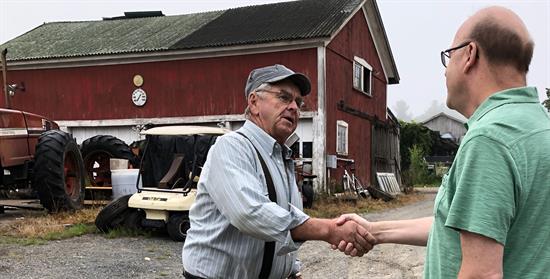McGovern, Blumenauer Introduce Legislation to Ban Dangerous Insecticides and Save America’s Pollinators
Washington,
February 21, 2019
WASHINGTON – Congressmen Jim McGovern (MA-02) and Earl Blumenauer (OR-03) today announced the reintroduction of the Saving America’s Pollinators Act to protect critical pollinators, like honeybees, from insecticides that are toxic to bees and other insects. The United States lost an estimated one-third of its honeybee colonies between 2016 and 2018 and national honey crops are the lowest on record in many decades.
This legislation fights this dramatic trend by suspending the use of toxic insecticides known as neonicotinoids, which have been linked to declining pollinator populations. It establishes a panel of experts to complete a thorough assessment of these pesticides, in order to ensure that any uses do no not cause unreasonable and adverse effects on pollinators. “Every summer I visit farms throughout Central and Western Massachusetts, and every summer I hear from farmers who tell me they’re deeply concerned that America’s honeybees and other pollinators are in real danger,” said Congressman McGovern. “Simply taking the word of pesticide manufacturers that their products are safe is no longer an option. We need oversight and accountability, and that’s why I’m proud to join Congressman Blumenauer in demanding that the EPA fully investigate the effect that certain products may have on pollinators. The sustainability of our nation’s food supply is at stake.” “Pollinators are critically important to our ecosystem. The food we eat depends on their health. If they are in danger, we are in danger” said Congressman Blumenauer. “The EPA has a responsibility to get to the bottom of this issue and they must be held accountable. We must do more to protect pollinators to ensure our food system is healthy and the agricultural economy remains strong.” Tara Cornelisse, Senior Scientist for the Center of Biological Diversity, said “We are experiencing a biodiversity crisis and losing insects faster than any other group of animals due to our chemical-intensive agriculture. By suspending use of the most pollinator-toxic pesticides, the Saving America’s Pollinators Act is a huge and important step towards saving the insects that we depend on so much to grow our food.” U.S. agriculture heavily relies on honey bees and native bees. One-third of food produced in North America--including nearly 100 varieties of fruits and vegetables such as almonds, avocados, cranberries, and apples--depends on pollination by bees. One of every three bites of food we eat is from a crop pollinated by bees and pollination services of native pollinators, contributing over $3 billion to the United States agricultural economy and over $125 billion globally. Over the past several years, national surveys sponsored by the federal government indicate that United States beekeepers lose 35-46% percent of their hives annually and on average, two-thirds of beekeepers have experienced loss rates greater than the established acceptable winter mortality rates. There are currently more than 40 pollinator species federally listed as threatened or endangered, and most recently, the iconic monarch butterfly has declined by 90 percent. Thousands of scientific studies have implicated neonicotinoids as key contributors to declining pollinator populations. The Saving America’s Pollinator Act protects the health of our pollinators and food system and allows a panel of experts to determine the risks associated with neonicotinoids. |
Press Releases
Constituent Services
Read More
How can I help?
From getting answers from government agencies to cutting through red tape to get you results, my office is here to help.
